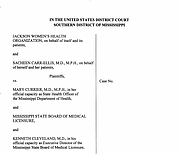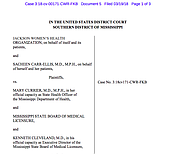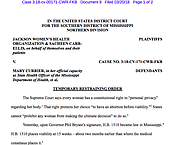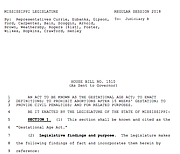Tuesday, March 20, 2018
U.S. District Court Judge Carlton Reeves blocked Mississippi's 15-week abortion ban for 10 days, less than 24 hours after Gov. Phil Bryant signed it into law. Photo by Imani Khayyam.
JACKSON — It took less than 24 hours for Mississippi's 15-week abortion ban to become law and then be stopped from taking effect. U.S. District Judge Carlton Reeves blocked the most restrictive abortion ban enacted in the country this morning for 10 days.
Attorneys representing the state's only abortion clinic and Sacheen Carr-Ellis, the medical director there, asked the federal court for a temporary restraining order on Monday, after Gov. Phil Bryant signed House Bill 1510 into law.
Carr-Ellis wrote that the law, which became effective immediately, would affect a patient she is scheduled to see this afternoon at 2 p.m. for an abortion.
"If the ban takes effect, we will have to stop providing abortions after 14 weeks 6 days lmp (last menstrual period), including canceling the appointment of the patient already scheduled for Tuesday, because we cannot risk the civil and other penalties that the ban imposes," Carr-Ellis wrote in her declaration. "This patient will not be able to obtain an abortion in Mississippi. She will either be forced to carry her pregnancy to term against her will or have to leave the state to obtain care."
Judge Reeves agreed to grant the plaintiff's request for a temporary restraining order.
"The law threatens immediate, irreparable harm to Mississippians' abilities to control their 'destiny and ... body,'" Reeves wrote in his temporary restraining order, quoting the Casey v. Planned Parenthood U.S. Supreme Court opinion.
"This is especially true for one woman scheduled to have a 15-week abortion this afternoon. A brief delay in enforcing a law of dubious constitutionality does not outweigh that harm, and in fact serves the public's interest in preserving the freedom guaranteed by the United States Constitution," he continued.
This morning in an emergency hearing, Rob McDuff argued on behalf of the Jackson Women's Health Organization and Ellis, over speakerphone, that the U.S. Supreme Court has repeatedly held that a state may not prohibit any woman from ending a pregnancy before viability.
"Fetal viability does not occur at 15 weeks," McDuff told the court.
Assistant Attorney General Paul Barnes, representing State Health Officer Mary Currier and the other named defendants, emphasized the State's interest in "protecting unborn life" as the "underpinning justification for this law."
He said if the restraining order was granted, "there is one unborn life that this law was unable to protect," Barnes said.
The Mississippi Department of Health's informed-consent material says that a fetus has "no chance of survival outside the womb" up to 18 weeks and notes that "survival outside the womb is not probable" from 18 to 20 weeks. Under Mississippi law, doctors who perform abortions must tell patients the informed-consent material is available if they want to see it.
Carr-Ellis writes in her declaration that viability in a normal pregnancy occurs around 23 weeks.
Barnes showed the court research, cited in HB 1510, called "Risk Factors for Legal Induced Abortion Related Mortality in the U.S" as he listed off health risks to a woman in late-term abortions.
"One of the things they cannot deny is the risk-factor of gestational age," Barnes said, saying the risks increase with each week.
Another study, published this week by the National Academies of Sciences, Engineering and Medicine, declares that abortions in the U.S. are safe and that complications are "rare."
Viability, and where the "line" is in terms of weeks, is likely to come up again in this case. Barnes noted the "gray area" in balancing a state and a woman's rights in abortion cases, especially in the area of viability.
"That is an issue we will have to explore at length," he said.
McDuff rejected this argument, noting that abortion opponents could just keep pushing the viability time limit further and further back.
"If that argument is true, the state could continue to dial back the right to choose," he said. "... They could abolish the right to choose."
Reeves asked Barnes if the Legislature had any hearings on the bill, with doctors testifying about the potential of viability at 15 weeks.
"Did the Legislature have any hearings on this legislation?" Reeves asked Barnes.
"I do not know," he said.
They did not, outside of normal committee meetings where the bill was discussed. In fact, the bill is based on model language from the conservative Alliance Defending Freedom, and is the first of a planned wave of 15-week abortion bans with the goal of ending legal abortion outright.
McDuff told the court that the Jackson Women's Health Organization performed 78 abortions last year after the 15-week period—not 200 as lawmakers falsely claimed when they passed the measure. The clinic does not perform abortions past 16 weeks, he added.
Gov. Phil Bryant signed HB 1510 into law on Monday, quipping that he expected a lawsuit to follow. Last week, Bryant told Tony Perkins, president of the Family Research Council, that the measure would protect children and minorities.
"We are protecting the unborn children of this great state, many of whom are minorities, many of whom are female, obviously many that are at 15 weeks are moving in their mother's womb," Bryant said on Perkins' radio show. "... We are going about protecting women, protecting minorities from being torn apart during these horrible later-term abortions."
The governor said the case could go to the 5th U.S. Circuit Court of Appeals and perhaps to the U.S. Supreme Court.
"If we need to go to the Supreme Court, we're willing to do that," Bryant said, noting that Attorney General Jim Hood has warned of expensive litigation. "... My question immediately was what price can you put on a life of a child?"
Judge Reeves asked the parties in the lawsuit to quickly file briefs for and against a preliminary injunction.
Email state reporter Arielle Dreher at [email protected].




